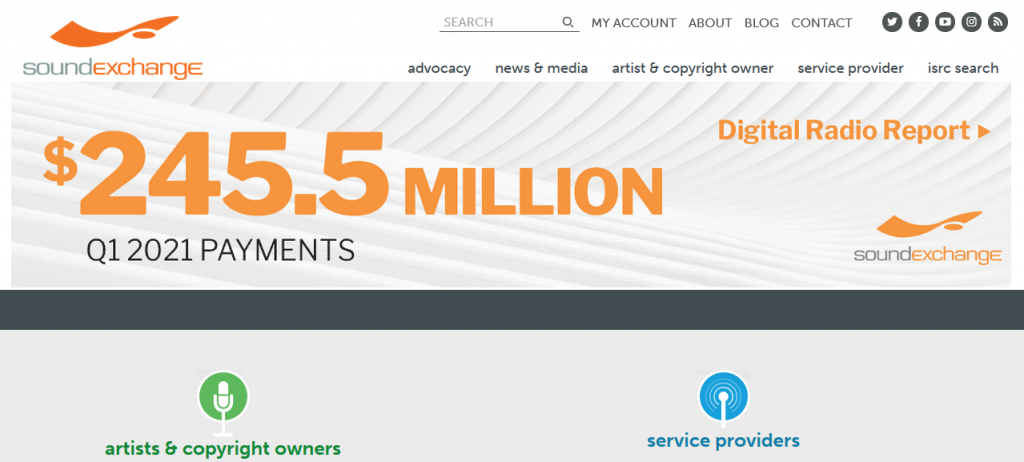
Photo Credit: Stewart Munro
Music royalties are confusing. Most of us are not trained music lawyers. We’re musicians trying to make a living.
And you probably just want to know how to earn the royalties owed to you.
So in this post, I’ll cover the four main types of organizations that collect the several different types of royalties generated when someone uses or streams a song you wrote and/or recorded.
But first, let’s cover the basics…
What Are Music Royalties?
Music royalties are payments to the rightful owners of a song, which can include songwriters, recording artists, and/or publishers. Anyone who holds the rights to any part of a song is owed music royalties when a song is played or used by someone else.
Whenever a third party uses your song, they have to pay a fee to use it. This money is then collected by different organizations depending on the type and territory of use.
Here are the types of places that, if they use your music, will pay out a royalty:
- Streaming platforms (when someone streams your song)
- Radio stations
- TV stations (commercials and shows)
- Non-interactive online radio stations (like Sirius XM and Pandora)
- Music venues
- Any public place that plays your music (like restaurants, bars, and coffee shops)
How Music Royalties Are Divided
So we know musicians get paid royalties, but exactly who gets royalties from a song?
Every song that’s been recorded has two separate rights attached to it: the composition rights and the master recording rights.
The songwriter(s) owns the composition rights, and therefore the songwriting royalties (unless they have a publisher, then the publisher takes all or some of the composition royalties).
Whoever records that song owns the master recording rights to that specific recording of the song, and therefore the master recording royalties (sometimes this can be a label).
So every time a royalty is generated, both the songwriter(s) and recording artist(s) are owed a portion of that money.
The 4 Main Places That Collect Music Royalties for You

There are several different types of royalties you’re owed. But exactly how are royalties collected in music?
Fortunately, you don’t have to collect them yourself. There are four types of organizations that will collect royalties for you, or pay you directly for using your song.
Each country has different organizations that collect different royalties, so I’ll just be focusing on royalties in the United States.
Here are the four places you need to register your songs with to get the money owed to you…
Digital Distributor
Digital distributors are the companies that deliver your music to Digital Service Providers (DSPs), like Spotify, Apple Music, etc.
Then whenever someone plays your song on one of these interactive streaming platforms (“interactive” meaning the listener can choose their music), the platform owes you a streaming royalty.
Each DSP pays streaming royalties directly to the digital distributor of that music. The payout for each DSP varies, and many distributors take a percentage of the payouts.
If your music is on Spotify and Apple Music, your distributor is automatically collecting streaming payouts for you.
(Whenever someone plays your song on a streaming platform, the DSP also owes you a mechanical royalty, but that goes through another organization. We’ll get into that below).
Royalties a digital distributor collects: streaming royalties
Performance Rights Organization
A Performance Rights Organization (PRO) represents songwriters and publishers.
And anytime there’s a public performance of your song, you’re owed a performance royalty. A PRO collects these royalties for you.
What’s considered a “public performance”?
This is when:
- You or someone else plays your song live
- A public place (like a bar, restaurant, or coffee shop) streams your song in their establishment
- Your music is on TV or in a video game
- A radio station airs your song
The biggest PROs in the U.S. are ASCAP and BMI (there’s also SESAC and GMR, but those are invite-only).
With each composition, there are two royalties generated: the songwriter side and the publisher side (different from the sound recording royalty).
If you register your songs with ASCAP, you’ll need to create a “vanity publishing company” so you can collect the publisher’s side of the royalties.
If you’re with BMI, you don’t need to create a publishing company because BMI will pay you both the songwriter and publisher royalties (unless otherwise stated). To ensure you get all of your publishing royalties, you may also want to sign up with a publishing admin company (see below).
Royalties a PRO collects: performance royalties (for songwriters and publishers)
Publishing Admin Company
A publishing admin company collects your performance royalties if you’re not already registered with a PRO. They also collect performance royalties from other countries even if you are registered with a PRO.
BMI and ASCAP can collect your foreign performance royalties, but a publishing admin company can do it faster as they often will register your songs directly with PROs in other countries.
Publishing admin companies also collect mechanical royalties generated from streams or sales of your music (paid by the DSPs).
Currently, the Mechanical Licensing Collective is the only entity that collects and pays out mechanical royalties in the U.S. ‒ your publishing admin company should already be partnered with the MLC as well as mechanical royalty organizations outside the U.S. If you work with a publishing admin company, you don’t have to also register with the MLC.
Some digital distributors, like CD Baby and Tunecore, offer publishing admin services. But there are standalone publishing admin companies, like Songtrust (what I use) or Sentric.
To be clear, with companies like Songtrust, you keep 100% ownership of both your songwriter and publisher share. They simply collect these royalties for you after taking a cut.
Royalties a publishing admin company collects: performance royalties and mechanical royalties
SoundExchange
Remember how there are two sides to every recorded song? The composition side and the sound recording side?
PROs collect the composition royalties. SoundExchange collects the sound recording royalties (U.S. only).
SoundExchange collects digital performance royalties for non-interactive uses of the recording of a song. “Non-interactive” means the listener can’t choose their music, so this would include Pandora, SiriusXM, and Beats 1.
SoundExchange is the only entity in the U.S. that collects sound recording performance royalties.
They also collect neighboring rights royalties. What are those?
Neighboring rights royalties are generated from sound recording performances in countries outside the U.S. (you know, our neighbors around the world).
And the good news for U.S. musicians ‒ SoundExchange works with nearly every neighboring rights organization in the world.
Royalties SoundExchange collects: digital sound recording performance royalties for non-interactive streams in the U.S.
Final Thoughts
I know, that’s a lot of info. Music royalties are confusing.
But honestly, you only need to know the basics in order to start collecting the money you’re owed. Hopefully, this post has simplified the topic enough that you know where to register your songs so you can start earning all the royalties you’re owed.
Get set up with each of these four types of organizations so your money doesn’t get lost in the ether!
